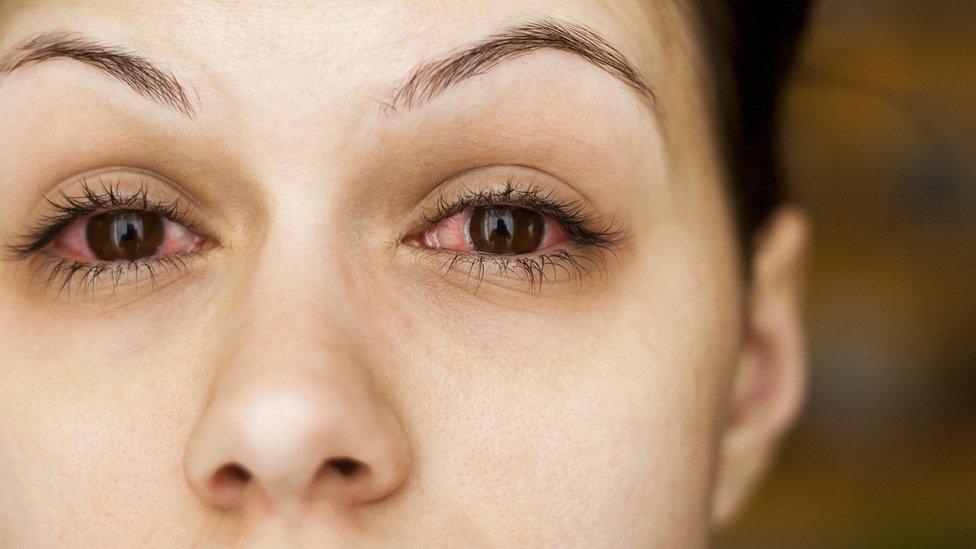Coronavirus: Can it affect eyesight?
- Published

Dominic Cummings has faced a media grilling over his decision during lockdown to drive his family 260 miles to his parent's property in Durham.
While he was defending his actions, it emerged the family also took a 30-minute car trip to the town of Barnard Castle at the end of their 14-day quarantine for coronavirus symptoms.
They had not been sightseeing, he said.
It had been to test his eyesight, which had "been affected" by the virus, before the long drive home to London.
His boss, Prime Minister Boris Johnson, backed the claim, saying: "On the point about eyesight, I'm finding I have to wear spectacles for the first time in years… so I'm inclined to think that's very, very plausible".
Eye symptoms with the virus have been reported, says the Royal College of Ophthalmologists and the College of Optometrists, external.

Like any upper respiratory tract infection, including colds and flu, it can cause irritation of the membrane covering the eye - a condition called conjunctivitis or sometimes pink or red eye (because the whites of the eyes become bloodshot).
And the World Health Organization, external now includes this alongside other more common symptoms of the virus, such as cough, fever and loss of taste or smell.
But UK guidelines do not.
Viral conjunctivitis can make the eyes water and feel gritty and uncomfortable, rather than painful.
It does not usually interfere greatly with eyesight.
But if the front of the pupil and the iris (the coloured part of the eye), is also affected, there can be some blurring of vision.
Prof Robert MacLaren, an eye expert at the University of Oxford, said a recent study in Wuhan, China, where the coronavirus outbreak began, reported a range of eye problems, including swelling and sticky eye.
"Any of the above symptoms may affect vision and affected patients would be advised to drive with caution or not at all if there was significant blurring of vision or double vision," he said.
A spokesman for Moorfields Eye Hospital said such cases were rare, and more evidence was needed to explore any link to coronavirus.
The RNIB says any sudden change in vision should be taken seriously and is a reason to seek immediate medical advice from an optometrist or NHS 111.

RISK AT WORK: How exposed is your job?
SCHOOLS: When will children be returning?
EXERCISE: What are the guidelines on getting out?
THE R NUMBER: What it means and why it matters
LOOK-UP TOOL: How many cases in your area?
GLOBAL SPREAD: Tracking the pandemic
RECOVERY: How long does it take to get better?
A SIMPLE GUIDE: What are the symptoms?

Conjunctivitis caused by other viruses and bacteria is highly contagious.
Coronavirus can certainly enter the body through the eyes (as well as the nose and mouth).
And it can be spread by coughs and sneezes.
But whether the eyes are a source of contagion is, as yet, unclear.
Italy's first coronavirus patient, a 65-year-old woman, had conjunctivitis, a report in the journal Annals of Internal Medicine, external says.
And swab samples of her tears revealed detectable levels of the virus.
- Published18 May 2020
